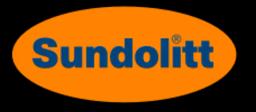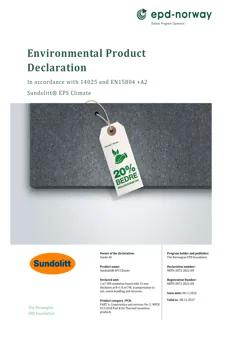

Other manufacturers with similar products
EPD: EPS insulation boards, R=1m2 k/W, 31 mm, 1.07 kg/m2, 14.7 kg/m3, 80 kN/m2 pressure class, Sundolitt® EPS Climate, Sunde AS
Discover exceptional energy efficiency with Sundolitt® EPS Climate insulation boards. These innovative EPS boards are lightweight, easy to handle, and deliver outstanding thermal performance, making them the ideal choice for sustainable building projects.
Sundolitt® EPS Climate is a lightweight insulation solution designed to provide superior thermal efficiency. Its smooth surface ensures easy installation and it is compatible with various building applications, enhancing energy savings and comfo...
Manufacturer:
Sunde AS
Group:
Country of production:
Product name:
EPS insulation boards
Commercial names:
Sundolitt® EPS Climate
Category:
Insulation
Class:
EPS (expanded polystyrene) insulation
Type:
EPS unfaced
Environmental impacts
Global Warming Potential (A1-A3):
1.41 kg CO2e/m²
Technical specification:
R=1m² k/W, 31 mm, 1.07 kg/m², 14.7 kg/m³, 80 kN/m² pressure class
Available units for calculation:
m², kg, ton, m³
Unique identifier (OCLID):
65b699670c5d9d0fdb06437a
Sustainability data background information
EPD number:
NEPD-3872-2822-EN
EPD program:
EPD Norge
Publication year:
2022
Product Category Rules (PCR):
NPCR 012:2018 Part B for Thermal insulation products
Environmental standard:
EN15804+A2
Data source:
EPD Sundolitt® EPS Climate
Verification status:
Third-party verified (as per ISO 14025)
Upstream database:
ecoinvent



